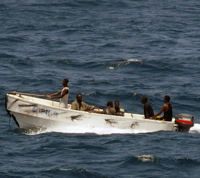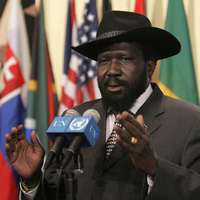Africa Archive
Free Newsletter
Noting an improvement in Zimbabwe’s political situation since the signing of a power-sharing agreement in 2008, the European Union last week eased its targeted sanctions against the country’s leadership even as it encouraged further political reforms. With the goal of pushing further progress toward fair and peaceful elections, the EU removed visa bans and asset freezes on 51 individuals and 20 companies with links to the ruling party, ZANU-PF. But it kept an arms embargo in place, extended a freeze on aid for another six months and kept more than 100 party officials, as well as Zimbabwe’s President Robert Mugabe, […]
Representatives from more than 50 countries, including U.S. Secretary of State Hillary Clinton and Somali President Sheikh Sharif Ahmed, have gathered in London for an international conference on Somalia, chaired by British Prime Minister David Cameron. In the words of Philip Barton, deputy head of mission at the British Embassy in Washington, the conference will focus on “the underlying causes of instability and its symptoms, such as famine, piracy and terrorism.” With piracy increasingly threatening international shipping, and the militant Islamist group al-Shabab developing closer ties to al-Qaida, problems that have plagued Somalia for two decades are posing a growing […]

Over the past decade, the western Indian Ocean unexpectedly emerged as a hotbed for maritime crime as pirates — safe-havened in Somalia — menaced seafarers as far east as the Maldives. Shipping companies have been hit hard, with one estimate placing the direct costs of Somali piracy at $5.5 billion in 2011. Despite a multinational naval flotilla deployed to counter the pirates, attacks continued to grow last year. The discussion of Somali piracy predominately characterizes it as an aberration — a situation made possible by a failed Somali state that abuts a major shipping route. Viewed through such a prism, […]

Over the past 30 years, the process of globalization has revolutionized international affairs. The amount of trade has tripled, and the ease with which goods, money, services and people now circulate globally has resulted in soaring economic growth and development that has benefitted almost all countries. Perhaps the most significant change has taken place in the Global South. Developing countries’ share of world trade has risen from around 10 percent in the mid-1990s to around 20 percent today. Even amid the recent global economic downturn, developing countries have still managed to significantly increase their share of global trade (.pdf). Partly […]

Since returning to civilian rule in April 2011, Niger has achieved a measure of political stability. In July, President Mahamadou Issoufou weathered his first major domestic crisis, a coup attempt, whose plotters were arrested by authorities soon thereafter. The president recently increased the salaries of civil servants and reduced the costs of electricity and water, moves calculated to address economic grievances. Critically for this impoverished country, external donors regard Issoufou’s administration favorably; aid suspended after the February 2010 coup that removed former President Mamadou Tandja from power has been restored or increased. Finally, a small amount of oil — around […]
When South Sudan seceded from Sudan, it took three-quarters of Sudanese oil production with it, and the two countries have disputed oil revenues and transit fees ever since. Because South Sudan lacks oil infrastructure, it must transport its oil northward through existing pipelines to Sudan’s Port Sudan, on the Red Sea, where there are refineries and loading facilities for tankers. Seeking other options for oil exports, the landlocked country is now considering building an oil pipeline through Ethiopia and Djibouti, and signed an agreement last month to link its oil fields with a coastal town in Kenya. “Any sane or […]
Over the past 10 days, 54 Chinese nationals have been taken prisoner in Sudan and Egypt, putting greater pressure on China to protect its 800,000 citizens working overseas in resource-rich but high-risk investment environments. On Jan. 28, rebels allied with South Sudan seized 29 Chinese construction workers building roads in the Sudanese border state of South Kordofan. Three days later, Bedouin tribesmen kidnapped 25 Chinese cement factory workers in Egypt’s Sinai Peninsula. The prisoners taken in Egypt were released the next day, and those in Sudan were freed Tuesday — after more than a week in captivity — following the […]
Political conflict is escalating in the normally peaceful West African nation of Senegal, with protests turning deadly earlier this week as paramilitary police opened fire on demonstrators, leaving two dead. The protests came in response to the constitutional council’s ruling that 85-year-old President Abdoulaye Wade could seek a third term in elections scheduled for Feb. 26. Wade had argued that the two-term limit imposed in 2001 does not apply to his first term in office, which began a year earlier, and the council, whose five members were picked by Wade himself, agreed. From Dakar, the capital, the ensuing protests quickly […]

In December, with a dispute over oil-transit fees between Sudan and South Sudan exacerbating already tense post-independence relations, the world looked to China to save the day. Beijing sent Special Envoy Liu Guijin to negotiations in Addis Ababa in the hopes of brokering a deal on oil revenues and facilitating a final post-independence settlement between the two sides. A month later, the crisis between and within the two Sudans continues. But the episode raises the question of whether China’s evolving Sudan policy reflects a broader evolution in its approach to African and international diplomacy. China’s current relations with the two […]
